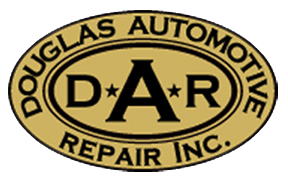We all know how important the cooling system is: coolant/antifreeze circulates around the engine, absorbs heat, and then dissipates it in the radiator. Cooling system failure can cause extensive engine damage. There are a couple of fine points that may be useful to you.
One is about minor coolant leaks. It’s tempting to put off repairing small cooling system leaks — we just keep topping off the coolant. There are several problems with this. First, coolant is messy. It doesn’t just evaporate away. The puddle is harmful to the environment and is toxic to pets. Second, the cooling system needs to maintain a certain pressure to do its job. A leak compromises the pressure. Third, small leaks can unexpectedly become big leaks that leave you stranded. Fourth, you need to keep the correct balance of coolant/antifreeze and distilled water to maintain proper boil and freeze properties.
Another point is corrosion protection. Antifreeze/coolant contains a package of anti-corrosion additives. These additives coat internal surfaces throughout the entire cooling system. They protect against oxidation which can lead to leaks as well as scale that clogs cooling system components. The protective coating is constantly reacting to chemical compounds created by the extreme heating and cooling cycle the coolant goes through. Over time, the coating is depleted and there is nothing left to protect the exposed metal in the engine and other system parts.
This is why your vehicle manufacturer recommends your coolant/antifreeze be changed periodically. Even though your old coolant may be cooling your engine just fine, it leaves it exposed to corrosive elements that will damage the system. A best practice is to also have a coolant exchange performed when replacing a cooling system component. For example, when you put in a new water pump it is not coated with anti-corrosion additives. If your anti-corrosion package is already depleted, the new water pump will immediately be subject to corrosive elements that will quickly start to reduce its life cycle. If you change the coolant when the new water pump is installed, it will be protected the first time you start the engine.
When we do a coolant exchange at Douglas Automotive Repair, we try to remove as much of the old coolant and accumulated sediment from the system as possible. We also give your cooling system a thorough inspection. Ask us if it’s time for a cooling system service. And if you suspect a leak, let’s get that repaired right away.
Give us a call today!
This entry was posted in Cooling System, Vehicle Maintenance and tagged cooling system, Vehicle Maintenance on .

